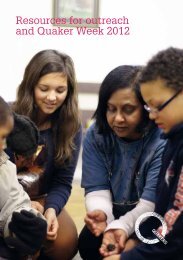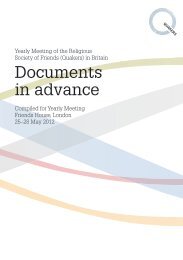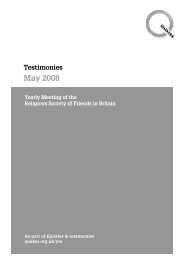Circles of Support and Accountability - Interim report [PDF ... - Quakers
Circles of Support and Accountability - Interim report [PDF ... - Quakers
Circles of Support and Accountability - Interim report [PDF ... - Quakers
Create successful ePaper yourself
Turn your PDF publications into a flip-book with our unique Google optimized e-Paper software.
When the Circle first meets, they make a covenant or contract with one another, which will<br />
include being committed to openness within the Circle, confidentiality beyond it <strong>and</strong> a respect for<br />
consensus decision making. The Core Member will promise that there will be no more victims at<br />
his h<strong>and</strong>s <strong>and</strong> will commit himself to following his release plan.<br />
After the Core Member’s release, the Circle arranges for weekly meetings <strong>and</strong> for contact <strong>of</strong> some<br />
sort between the Core Member <strong>and</strong> another member every day. These could be informal social<br />
contacts such as going shopping together, or could be just a phone call sometimes. Over time, the<br />
frequency <strong>of</strong> meetings will reduce to, say, once a fortnight <strong>and</strong> the contacts with individual Circle<br />
members would also become less frequent. Milestones such as birthdays are celebrated <strong>and</strong> seen<br />
as important. If the Circle is concerned about the Core Member’s behaviour, they will challenge<br />
him <strong>and</strong> may begin to meet more intensively for a while to help him to address the problem. It is<br />
crucially important that the Circle knows at what point to inform the statutory authorities – police<br />
or probation – about a problem. The ground rules for this are established at an early stage in the<br />
setting up <strong>of</strong> the Circle <strong>and</strong> close contact is maintained between the Circle <strong>and</strong> police <strong>and</strong><br />
probation. The Circle is not taking away their responsibility, but is a structured way for the<br />
community to take its share <strong>of</strong> responsibility.<br />
How <strong>Quakers</strong> got involved<br />
<strong>Quakers</strong> have a traditional interest in crime <strong>and</strong> prison issues, ever since they were imprisoned in<br />
large numbers when the movement started in the seventeenth century. There are close connections<br />
between Mennonites <strong>and</strong> <strong>Quakers</strong> in Canada. Some Canadian <strong>Quakers</strong> became involved in <strong>Circles</strong><br />
<strong>and</strong> began to write about the scheme in their journals. The Crime <strong>and</strong> Community Justice<br />
Committee, which I provided with staff support at the time, became aware <strong>of</strong> it by reading these<br />
journals. The Committee, part <strong>of</strong> the central structure <strong>of</strong> <strong>Quakers</strong> in Britain, were impressed by<br />
what they read, explored it further <strong>and</strong> then approached the Home Office Dangerous Offenders<br />
Unit with the proposal that a workshop should be run to inform key players in Britain about<br />
<strong>Circles</strong>.<br />
The Home Office agreed to co-host the workshop, which took place in June 2001. Five Canadians<br />
flew over – a Director <strong>of</strong> Parole, a member <strong>of</strong> Toronto Police sexual assault squad, a psychologist<br />
from the Correctional Services, the Executive Director <strong>of</strong> <strong>Circles</strong> <strong>and</strong> the National Chaplaincy Coordinator.<br />
At the meeting were representatives <strong>of</strong>: Home Office, parole, police, probation, prisons,<br />
sex <strong>of</strong>fender treatment, chaplaincy, victim support, NSPCC <strong>and</strong> several churches.<br />
Setting up the pilot programmes in Britain<br />
Responses to the Canadian presentations were positive enough for a series <strong>of</strong> follow-up meetings<br />
to develop. The Home Office invited two probation areas to consider setting up pilot schemes, one<br />
<strong>of</strong> which – Hampshire – responded positively <strong>and</strong> now works closely with the Hampton Trust,<br />
who manage the pilot programme with the help <strong>of</strong> Home Office funding.<br />
Meanwhile, Donald Findlater, then manager <strong>of</strong> the Wolvercote Clinic which provided sex <strong>of</strong>fender<br />
treatment programmes, was aware <strong>of</strong> particular men going out at the end <strong>of</strong> treatment ‘to<br />
nobody’. So Donald went ahead <strong>and</strong> set up a Circle for one man, recruiting <strong>and</strong> training the four<br />
volunteers himself. This led to the Lucy Faithfull Foundation, who ran the Wolvercote Clinic,<br />
taking on the management <strong>of</strong> a pilot <strong>Circles</strong> programme, to set up further <strong>Circles</strong> around the<br />
country, again with Home Office funding. At first the intention was to provide <strong>Circles</strong> for those<br />
4


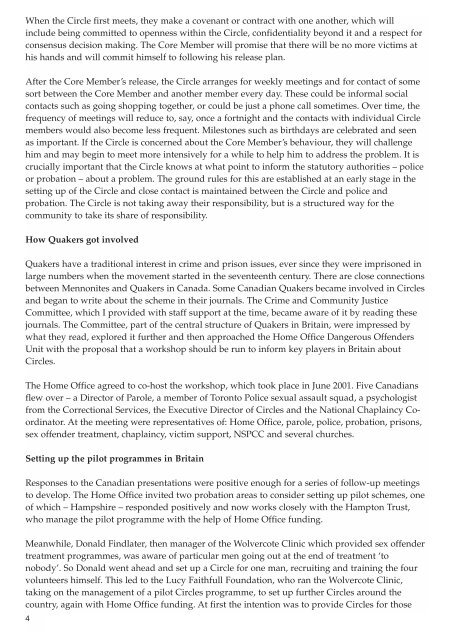
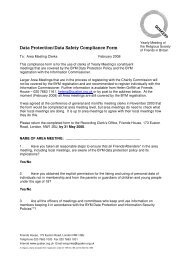

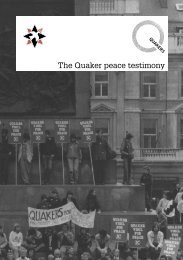
![2002 YM Minutes [PDF: 108k - opens in new window] - Quakers](https://img.yumpu.com/31588902/1/184x260/2002-ym-minutes-pdf-108k-opens-in-new-window-quakers.jpg?quality=85)
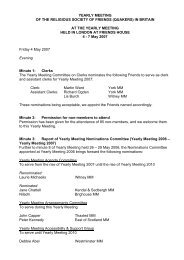
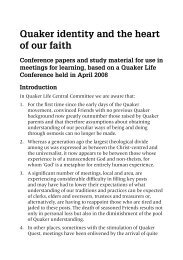
![Quaker Work in 2007 [PDF: 826kb - new window] - Quakers](https://img.yumpu.com/30178807/1/184x260/quaker-work-in-2007-pdf-826kb-new-window-quakers.jpg?quality=85)
![2004 YM Minutes [PDF: 132k - opens in new window] - Quakers](https://img.yumpu.com/29621403/1/184x260/2004-ym-minutes-pdf-132k-opens-in-new-window-quakers.jpg?quality=85)
